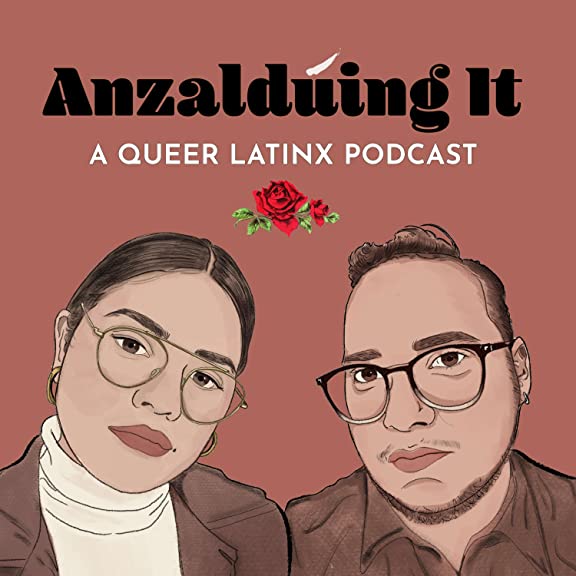Nicolette Lecy, Graduate Student Researcher
Anzaldúing It podcast hosts and creators Dr. Angélica Becerra (she/her/hers/ella) and Dr. Jack Cáraves (he/him/they/them/el) joined us virtually to share their thoughts on creating digital sonic spaces. Dr. Becerra is a queer, 1st generation Mexican American, and L.A. public school system alum. Aside from being a queer immigrant artist and activist, she is currently a Postdoctoral Fellow in Digital Technology & Culture at Washington State University in Pullman. The podcast co-host and producer, Dr. Cáraves, is a 2nd generation Mexican American who identifies as a trans-masculine and queer Chicanx/Latinx. He is currently an Assistant Professor at San Jose State University who conducts qualitative research focusing on experiences of transgender Latinxs in the U.S. and is doing a Postdoctoral Fellowship at the University of Illinois, Urbana-Champaign this year. Dr. Becerra and Dr. Cáraves met in 2012 during their Ph.D. program in Chicana/o and Central American Studies at UCLA and began Anzaldúing It in 2016.

Anzaldúing It is a Queer Latinx podcast that frequently touches on issues like navigating academia, relationships and mental health, and astrology and healing. The podcast’s name was inspired by the creators’ early exposure and personal and academic admiration for queer Chicana writer and scholar Gloria Anzaldúa. “Anzaldúing It” became a reference for code-switching and unapologetically moving between spaces, languages, and identities as queer Chicanxs.
As of April 2022, Anzaldúing It has 70 total episodes with almost 510, 000 plays from the U.S., Latin America, and even Europe, appealing to those seeking a sonic space for often stigmatized conversations about mental health and survival in relation to issues like racism, sexism, homophobia, and the ivory tower of academia. Dr. Becerra and Dr. Cáraves continued by describing various Chicana feminist influences, theorizing the need for the creation of a sonic counterspace, and using pláticas (talks/conversations) as a method of knowledge production and exchange. They ended their talk by addressing why the Anzaldúing It sonic archive must be free to combat elitist practices by maintaining the accessibility of this specific form of knowledge production.
The talk was followed by a Q&A where the speakers addressed questions about technical difficulties with podcast production and scheduling conflicts. They also discussed their worries about perfectionism and imposter syndrome when starting the podcast, dealing with public-ness and hypervisibility, and the need to take breaks from podcasting during significant life shifts/events (graduating with a Ph.D., starting tenure track jobs, and living and surviving in the pandemic).
